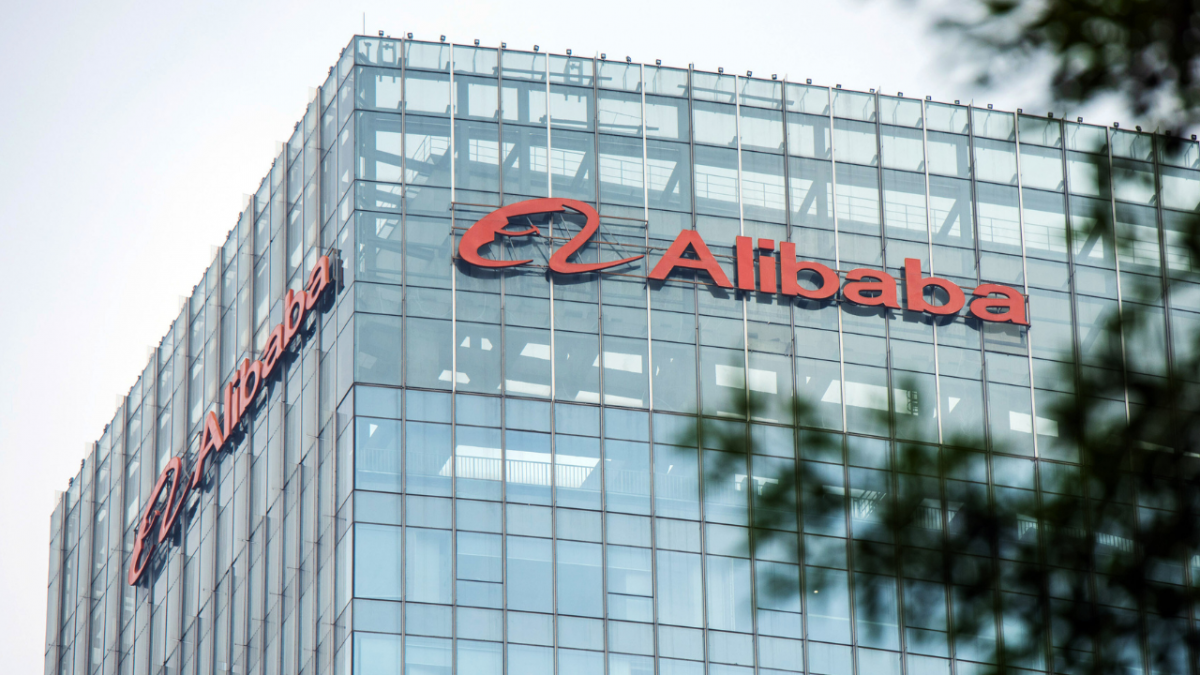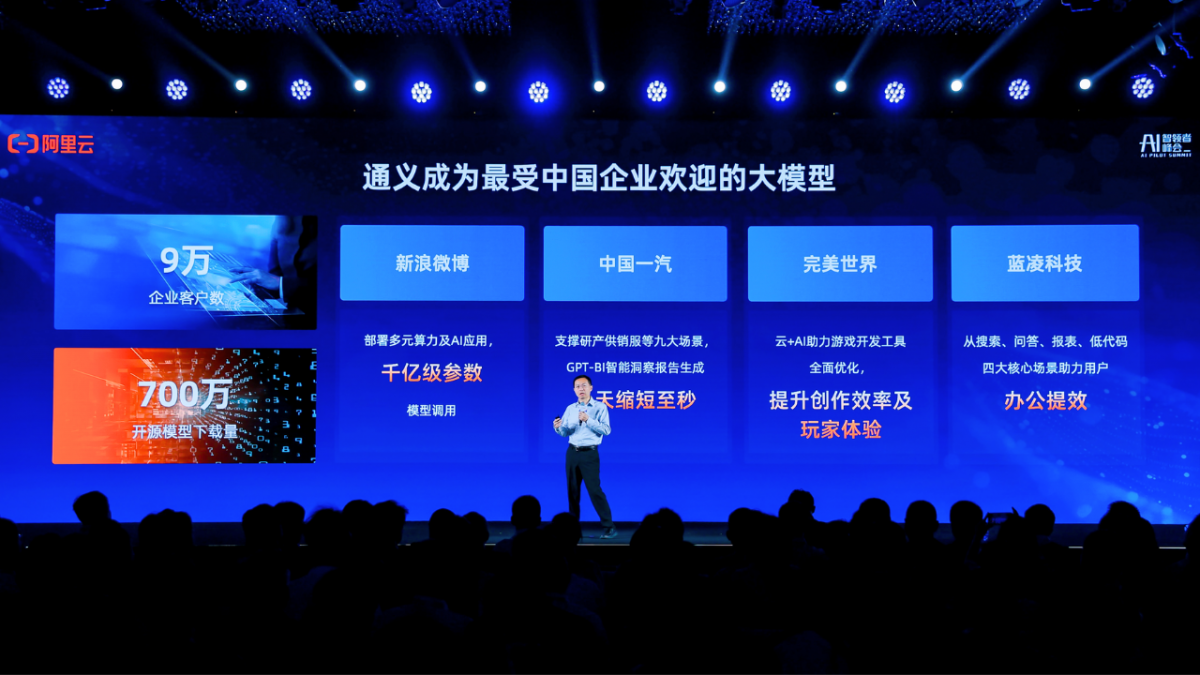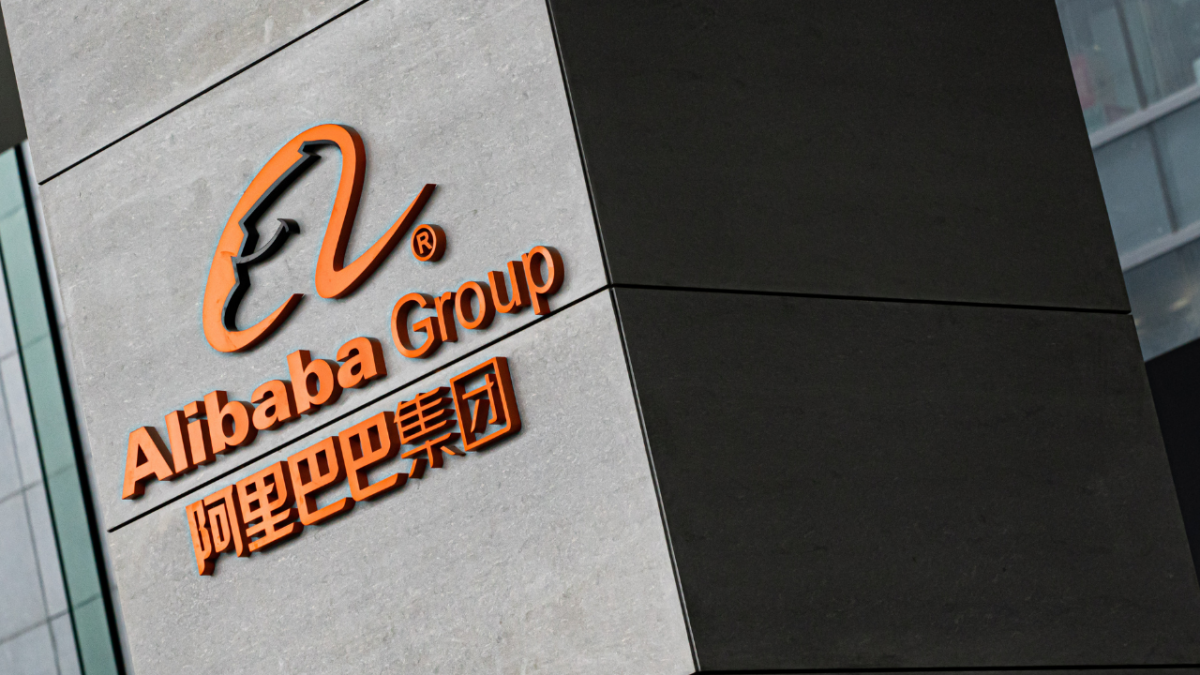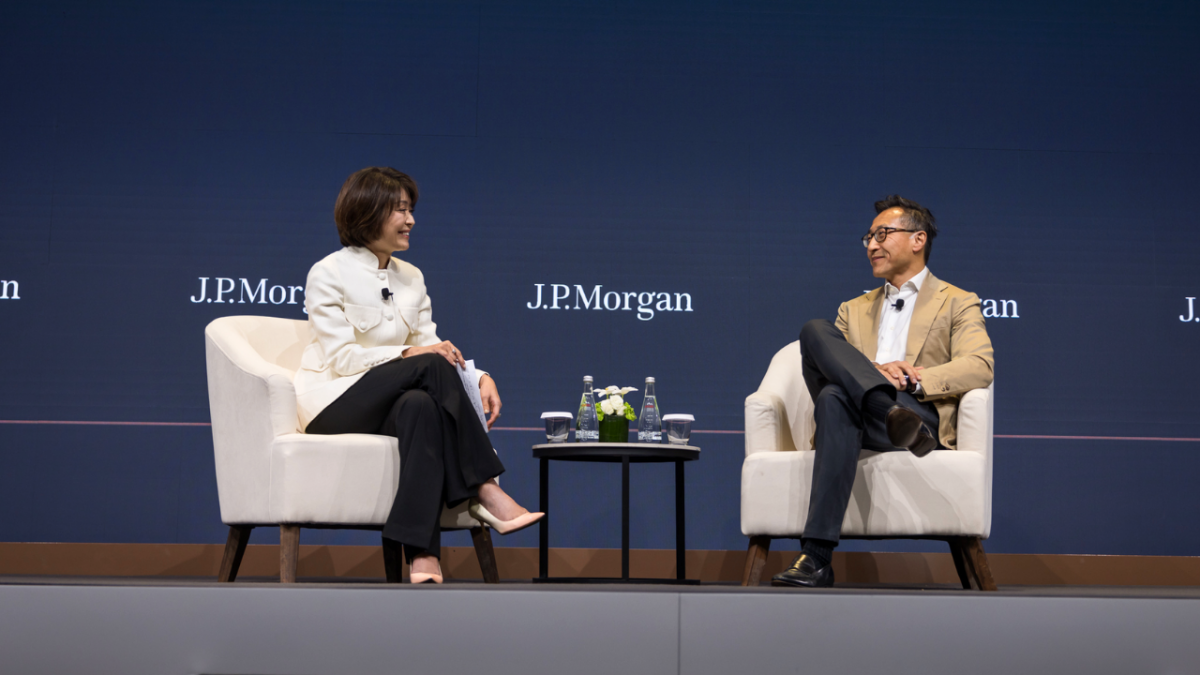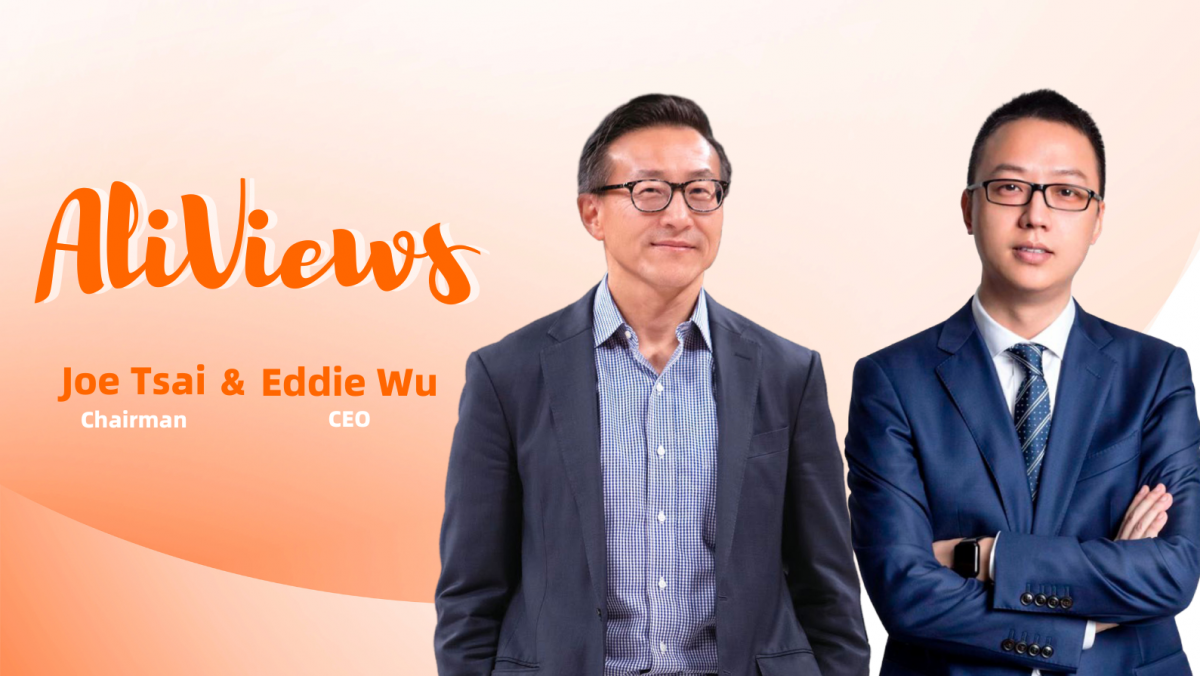


Left to right: Alibaba Group Chairman Joe Tsai and CEO Eddie Wu. Photo credit: Alibaba Group
Dear Shareholders,
Our fiscal year ended March 31, 2024 was a watershed. It was a year in which Alibaba made several pivots toward strategic clarity. This clarity has helped us to define who we are, our direction, and how we will execute our strategy.
We believe it is important to share the thought process we went through this past year, and what it means for Alibaba in the future.
Alibaba is about the future
Who We Are
Alibaba has two core businesses: e-commerce and cloud computing. As part of the consumer economy in China, we have developed an ecosystem of Internet platforms to tap into opportunities in local services, communications, search, and digital entertainment.
In e-commerce, we run Taobao and Tmall Group (TTG), which includes platforms for the domestic China consumer and business-to-business markets, and Alibaba International Digital Commerce Group (AIDC), which includes platforms for the international consumer and business-to-business markets.
Other divisions in the company provide strategic value by bringing synergies that make our e-commerce businesses more valuable.
For example, the on-demand delivery business Ele.me provides the infrastructure for instant delivery of fresh and perishable items purchased from our e-commerce platforms; and our logistics subsidiary Cainiao provides the supply chain, transport, and delivery capabilities to create a great experience for the consumers shopping on the TTG and AIDC platforms.
In cloud computing, we aim to be the leading public cloud infrastructure and platform technology provider in China, supplying a broad range of capabilities to our customers, including elastic computing, storage, network infrastructure, security, big data, and artificial intelligence (AI).
Our Strategic Direction
We have chosen two important paths for the strategic direction of our business. As leaders of the company, we must clearly articulate our direction.
The first strategy is User First.
Users of our various platforms come first in the way we operate our business and design products, from user interface to algorithmic matching to customer service. China has the world’s largest Internet population with 1.1 billion users, and China’s e-commerce penetration is one of the highest in the world at around 28% of total consumer retail.
Today, you can find every kind of consumer product for sale online. If brands and distributors want to differentiate themselves, they will increasingly need the targeted consumer marketing services provided by Internet platforms.
Our User First approach will prioritize user experience in business strategy and product design to drive retention and repeat purchases.
We see ourselves again as a start-up defined by entrepreneurship, innovation, and our mission “to make it easy to do business anywhere”
This will provide the best value proposition to sellers of goods and services on our platforms, such as Taobao, Tmall, Xianyu, Fliggy, Ele.me, Amap, and AliExpress, because Alibaba is where they can find the most robust, well-segmented, and highest frequency user base for online consumption.
The second strategic direction is our focus on AI as the single most powerful element that will change and accelerate the growth of our businesses.
Over the next decade, no industry will be spared the disruption brought about by AI.
Rather than protecting the old way of doing things, AI has re-ignited our start-up passion and imagination. Each of our businesses has massive numbers of use cases, all of which can use AI applications to unleash powerful value, and the deployment of AI will increase demand for computing and drive growth for Alibaba Cloud.
AI will not be a threat but will herald in massive opportunities as the driver for breakthrough user experience and business models. If we don’t keep up with the constant and marvelous improvements that AI is showing us on a daily basis, we will be displaced.
Operating Principles
We follow a number of operating principles as we execute our strategy.
First, we take a long-term perspective when making hard decisions. We think in 10-year cycles as the development cadence of technology businesses typically experience the phases of investment, growth, harvest, profit, and invariable decline.
Our businesses are in different phases and must be managed differently. For example, AIDC is nascent and requires upfront investment; Alibaba Cloud is investing for future growth while harvesting the fruits of economies of scale; and TTG is a mature business that must innovate fast and capture the next growth cycle.
Second, we apply extreme focus and intentionality in everything we do. Focus means we are not distracted by unimportant things, and in determining what is important or not, we are unemotional when facing hard choices. Intentionality means we develop sound reasons for doing what we do.
For example, Alibaba Cloud’s pivot to a public cloud strategy reflects the rationale of our structural advantages in technology leadership and scale economies; at the same time, we made a hard choice to forego short-term revenue from low-margin project-based business.
In fiscal year 2024, we delivered value to shareholders by returning cash and creating earnings accretion
Last but not least, we communicate a clear direction to our teams and seek alignment from them by setting sound incentive systems. We believe that transparency of strategic direction and demonstration of intentionality from company leaders make a more productive and happier workforce.
We have developed employee incentive systems that are tied to our mid- and long-range strategic goals, so that our teams know exactly where they stand financially based on business performance.
Capital Management
In fiscal year 2024, Alibaba generated $21.6 billion in free cash flow. It is the responsibility of management to determine how we deploy our cash to maximize shareholder value. We face a trade-off of returning cash to shareholders on the one hand, and re-investing the cash into existing or new businesses on the other hand.
Our capital management activities in fiscal year 2024 reflected the company’s focus on our core business. We did not put money into new business lines. Instead, we declared and paid, for the first time in company history, a dividend of US$2.5 billion, and we repurchased US$12.5 billion of our own shares, which resulted in a net reduction of 5.1% in outstanding shares.
In fiscal year 2024, we delivered value to shareholders by returning cash and creating earnings accretion.
Investing for the Future
Returning cash to shareholders does not mean we will stop investing. There are two areas where Alibaba will continue to invest:
- to accelerate our core businesses’ growth, and
- to maintain leadership in fundamental technologies and innovation, including AI
It is important for you to understand our investment in AI. The latest developments in generative AI with new iterations of large language models (LLMs) from major global technology companies are relevant to Alibaba in three ways.
First, as technology pioneers, we are interested in exploring the potential of machine intelligence to achieve artificial general intelligence (AGI). Ultimately, humankind may be able to achieve AGI based on certain definitions.
The current approach that pushes toward AGI is LLMs that use the transformer architecture. As LLMs get bigger and go multimodal to incorporate voice, video and image in addition to text, the level of investment that is required in infrastructure and development can only be taken on by large technology companies that generate substantial free cash flows from their core business.
AI has re-ignited our start-up passion and imagination
Alibaba has a market-leading proprietary LLM, Qwen, and we will continue to invest in LLM and other AI innovations to push the limits of machine intelligence.
Second, investment in LLMs drives the growth of our cloud computing business as the training and usage of LLMs in development or inference will require computing resources. We have made open-source versions of our LLM Qwen available to the public, bringing additional demand for our proprietary model that results in computing resource needs.
We also have China’s largest open-source LLM community, ModelScope, which includes third-party LLMs for developers who need access to our computing resources. Thus, being a leader in the development of AI brings direct positive growth to our cloud computing business.
Third, Alibaba is an integral part of the consumer economy. The user experience within our multitude of consumer use cases can be transformed with AI applications, from shopping recommendations to virtual showrooms to personal assistants. We are excited by the limitless possibilities for AI to drive our User First strategy.
In closing, we want to say this: Alibaba is about the future.
In the past 25 years, Alibaba has grown consistently but, unfortunately, acquired “large company” characteristics. For the next ten years, we see ourselves again as a start-up defined by entrepreneurship, innovation, and our mission “to make it easy to do business anywhere.”
We will apply long-term thinking when we make trade-offs today and invest for tomorrow.
Joe Tsai, Chairman
Eddie Wu, Chief Executive Officer
May 23, 2024
Discover more content from Alibaba leadership in Alizila’s AliViews archives

